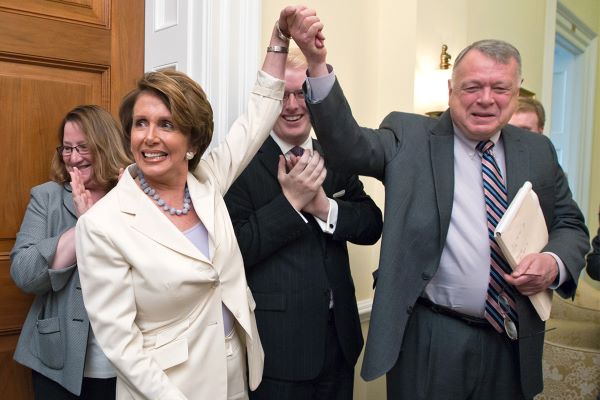


Pelosi aide sought to undercut Medicare for All
Wendell Primus told roughly two dozen attendees at a November meeting that House Democratic leadership worried a progressive push risked diverting attention from the party’s core health agenda.
A top aide to House Speaker Nancy Pelosi used a private meeting to encourage health policy groups to raise public concerns about “Medicare for All“ just weeks after Democrats recaptured the House majority, multiple people familiar with the session told POLITICO.
Wendell Primus, Pelosi’s senior health policy adviser and a long respected voice on health and domestic policy, told the roughly two dozen attendees at the Nov. 30 gathering that House Democratic leadership worried the progressives’ push for Medicare for All risked diverting attention from the party’s core health agenda — the agenda that won them the House and would likely animate Democratic voters right into 2020.
Pelosi herself has been tepid in her support of Medicare for All, while some Democratic presidential candidates and more liberal Democrats have gone all in for the single-payer health care movement, reflecting the serious divisions within the party’s moderate and left wings. But Primus dismissed Medicare for All during the private session as an unhelpful distraction, according to four people in the room and two people briefed on the meeting, and he expressed a need for more scrutiny of single-payer’s policy implications.
Some of those six sources interpreted it as a request for data and economic analysis, but others saw it as a harder-edged invitation to discredit the idea, or at least amplify its risks.
“It came across as, we need this so we can get on with our agenda,” according to a person in the room. “Can you help us point out the problems?”
In a statement, Pelosi spokesperson Henry Connelly disputed any suggestion that Primus sought negative material on Medicare for All.“Wendell absolutely did not ask for any kind of one-sided analysis of Medicare for All, and anyone who says otherwise wasn’t actually listening,” he said. “As Democrats, across the entire spectrum, we believe in legislating based on facts, data and honest analysis.”
President Donald Trump and other Republicans have sought to brand Democrats as “socialists” over the Medicare for All campaign, which would eliminate private insurance in favor of guaranteed government-funded coverage. Deep-pocketed industry groups, who either favor Obamacare or who have at least learned to live with it, are pouring resources into opposing single payer, and various other Medicare expansion ideas.
Top Democrats were focused on more pragmatic efforts to lower drug prices and protect pre-existing conditions. They worried those voter-tested priorities could be overtaken by progressives’ vocal advocacy for single-payer health care, Primus said during the meeting. Democratic leaders, he said, could use more research focused on the risks and tradeoffs of Medicare for All.
"No one has anything to fear from good faith research on Medicare for All,“ Connelly said.
The meeting was part of a broader series of confidential sessions held to help health policy researchers swap ideas and occasionally hear from policymakers across the political spectrum, two people in the room said, with the understanding that attendees are there to share information — not take marching orders. A more recent session featured John O’Brien, a senior Trump administration health official who works on drug pricing issues.
No lawmakers attended the November session, which was held at the Urban Institute and billed as a presentation of House Democrats’ health care priorities. Tiffany Guarascio, the deputy staff director for the Energy and Commerce Committee helmed by Rep. Frank Pallone, and Amy Hall, a top aide for Ways and Means Committee Democrats, were also on hand.
It’s not apparent that the meeting sparked any new outcry against Medicare for All — though plenty of Democratic writers and analysts have criticized the proposal as politically risky, overly ambitious and fiscally shaky.
Pelosi and her team have fought to keep the focus instead on strengthening Obamacare, which has grown in popularity since the GOP started trying to repeal it in 2017 — a priority that got an unexpected boost last week by the Trump administration’s full s
Linda Blumberg, an institute fellow at Urban’s Health Policy Center, told POLITICO in response to questions about the meeting that the think tank is “very, very protective” of its nonpartisan mission and reputation.“Our objective has always been and continues to be to provide the best possible research and analysis to support responsible policy conversations and debates,” she said, emphasizing that Urban doesn’t take policy positions.
Still, the session surprised and unsettled some in the room, who left with the impression that leadership wanted them to undermine a proposal that’s energized the Democratic base and won endorsements from more than a half-dozen aspiring presidential candidates.
“I nearly fell on the floor,” one person in the room said. “People were kind of stunned.”
Primus — a longtime Pelosi senior aide who played a lead role in developing Obamacare legislation a decade ago, and who in the 1990s quit an HHS post in protest of President Bill Clinton’s welfare reforms — reportedly told insurance executives in December that Democratic leaders would not endorse Medicare for All. His objections included the potential cost, and the difficulty of transitioning to a single-payer system.
In subsequent conversations with Democrat-aligned groups, top Democratic aides have voiced anxieties about the challenge of tamping down party divisions over health care, said people with knowledge of the discussions.
Rep. Pramila Jayapal, a lead sponsor for the House’s Medicare for All bill, told POLITICO that if true, Primus’ remarks were disappointing and unhelpful.
“I will take it up with our leadership to make sure we’re not undermining members’ bills,” she said, adding that Primus is “not a member of Congress.”
Publicly, House Democratic leaders initially took a more laissez-faire approach to Medicare for All, largely refraining from dismissing the idea and seeking to assuage the party’s vocal progressive bloc. But Pelosi expressed skepticism of the idea in a recent Rolling Stone interview, questioning how advocates plan to pay for a system that analysts project could top $30 trillion over a decade.
The House speaker did commit in January to hold a pair of first-ever hearings on Medicare for All in the Budget and Rules Committees — a concession Medicare-for-All supporters hailed as a victory, though one person familiar with the matter said Pelosi had long planned to offer the hearings to head off conflict with party progressives.
There are no plans to hold a vote this Congress on the House Medicare for All bill and little enthusiasm for allowing further hearings on the legislation.
Still, prominent Democrats have tried to prevent schisms. Amid House progressives’ February unveiling of their sweeping new Medicare for All proposal, top Democrats portrayed the bill as simply further evidence of the party’s broader focus on expanding affordable health care — and of the contrast with a GOP that spent years trying to roll back Obamacare’s coverage gains.
“We’re all for having health care for everybody,” Rep. Steny Hoyer, the No. 2 House Democrat, told POLITICO the day the Medicare for All bill was introduced. “It’s helpful to be talking about health care and its accessibility to all of our citizens.”
Yet House Democrats’ liberal wing plans to continue building momentum for single payer at the same time the party defends Obamacare, in hopes of pressuring the party to pursue Medicare for All if Democrats take full control of Washington in 2020.
“I’m thinking less about [Pelosi] and Wendell Primus and more about my own work to reach out to members,” Jayapal said, adding that Pelosi has been encouraging, despite not sharing her enthusiasm for Medicare for All. “I still take the speaker at her word.”
Progressive leaders in the meantime have so far refrained from attacking leadership over its policy stances — opting instead to cultivate relationships internally and rely on grassroots activists to take a more combative role with top Democrats.
House Democratic leaders are fixated on keeping that unity intact ahead of 2020.
“I think Nancy’s handled it well,” Budget Committee Chairman John Yarmuth said of the party’s delicate approach to Medicare for All. “We have to be really careful about the way we talk about it as a party.”